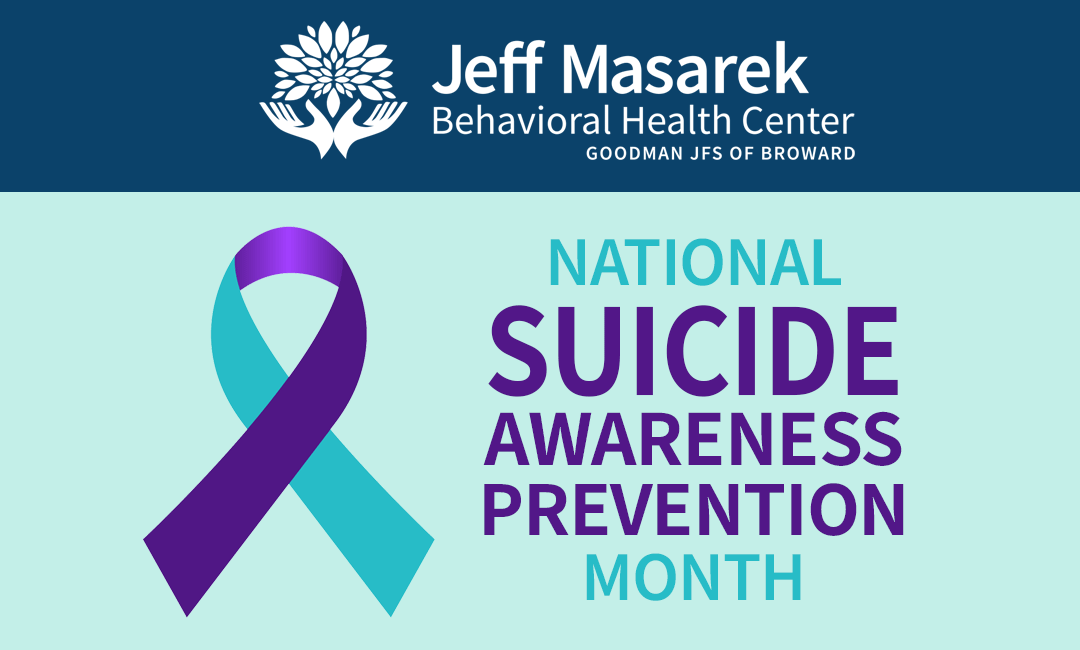By: Marc Hopin, CEO of Alpert JFS; Danielle Hartman, President & CEO, Rales JFS; Randy Colman, President & CEO of Goodman JFS; and Miriam Singer, President & CEO, JCS
While September is recognized nationally as Suicide Prevention Awareness Month, it’s important to recognize that suicides take place every hour of the day, every day of the week, and every month of the year. That said, now is an excellent opportunity to learn how to recognize those at risk of suicide and how to connect them with life-saving treatment services.
The alarming fact is that U.S. suicide rates reached an all-time high in 2022, with 49,500 people known to have died by suicide last year alone, according to the Centers for Disease Control (CDC). Additional information collected by the CDC to date suggests suicides are more common in our country now than at any time since the beginning of World War II.
Suicidality affects individuals of all ages and backgrounds and is often grounded in mental health disorders that have not been addressed. Our South Florida-based Jewish Family Services organizations, including Ferd & Gladys Alpert JFS, Ruth & Norman Rales JFS, Goodman JFS, and Jewish Community Services, have indeed seen an increase in the need for mental health services from residents in our local communities. It is for that reason that we are taking the opportunity to raise awareness about the availability of community-based social services organizations, and the support that is available to you or to someone you know who may be in crisis.
First, it is important to know the signs that indicate a person may be considering suicide and needs help. These warning signs include:
- Talking about suicide or expressing; a desire to die, that things would be better if they weren’t here anymore or that they feel they are a burden to others; feelings of hopelessness, great shame or guilt, unbearable pain or being trapped;
- Looking for a way to kill themselves, such as; searching online for methods, hoarding medications, and buying a gun;
- Exhibiting mood swings, appearing overly anxious, seeming agitated or behaving recklessly, including increasing the use of alcohol or drugs;
- Withdrawing from previously enjoyed activities or isolating themselves from loved ones;
- Changes in sleeping or eating habits;
- Showing rage or talking about seeking revenge; and
- Giving away prized possessions
What can you do if you see these signs? Immediately seek help by calling the national Suicide & Crisis Lifeline; simply dial 988. Lifeline counselors offer free, confidential, 24/7/365 crisis counseling support in English, Spanish, Creole, and many other languages. Counselors are available to provide free crisis intervention to members of the community struggling with thoughts of suicide, anxiety or depression. In addition to 24/7/365 availability for phone calls, support services are also available by texting 988.
In the local community, Jewish Family Services agencies offer additional resources. For example, Alpert JFS offers its own COMMUNITY ACCESS LIFE LINE (C.A.L.L.) by dialing 561-684-1991 to receive information, intake, and referral services. The support and guidance provided by C.A.L.L.’s professional staff often saves lives. There is also an opportunity to submit the contact form online, so that Alpert JFS staff may respond to you.
It can be difficult to talk to a loved one about suicide. And while there are several do’s and don’ts, the worst thing to do is nothing. Here is a list compiled by 998.lifeline.org to keep in mind:
- Be direct. Talk openly and matter-of-factly about suicide.
- Be willing to listen. Allow expressions of feelings. Accept those feelings.
- Be non-judgmental. Don’t debate whether suicide is right or wrong, or whether feelings are good or bad. Don’t lecture on the value of life.
- Get involved. Become available. Show interest and support.
- Don’t dare him or her to do it.
- Don’t act shocked. This will put distance between you.
- Don’t be sworn to secrecy. Seek support.
- Offer hope that alternatives are available but do not offer glib reassurance.
- Take action. Remove means, like weapons or pills.
- Get help from people or agencies specializing in crisis intervention and suicide prevention.
The last tip is worth repeating: Get help from people or agencies specializing in crisis intervention and suicide prevention. In north Palm Beach County, you can reach out to Alpert JFS at 561-684-1991; in South Palm Beach County, you can call Rales JFS at 561-852-3333; in Broward County, call Goodman JFS at 954-909-0888; and in Miami-Dade, call Jewish Community Services at 988.


